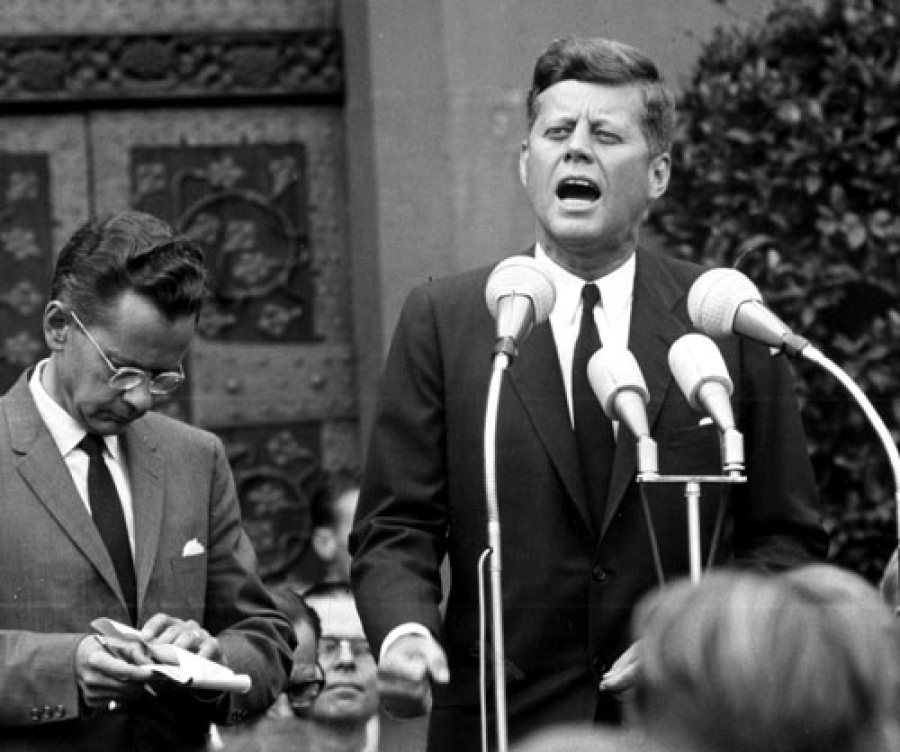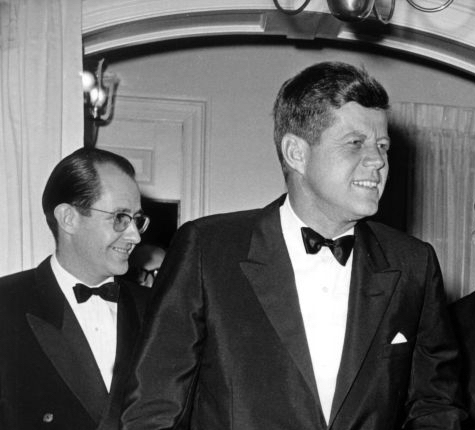NB: This is not about Doughnutgate, the myth having it that because he did not drop the indefinite article in the German sentence «Ich bin ein Berliner», Kennedy was understood to be saying that he was a doughnut. Read about that at Museum The Kennedys and on the Wikipedia page Ich bin ein Berliner («something of an urban legend»).
Linguistically, President Kennedy's state visit to West Germany in June 1963 was marked by spontaneity, culminating in a grammatical error in the German rendering of the finale of the Schöneberg City Hall speech in Berlin. The error is missing in transcripts, and the recording where the German bits are still there is hard to come by. But here it is, loud and clear – along with a piece of the background.
Before Berlin, Kennedy made speeches in Cologne, Bonn and Frankfurt, and his interpreter was Robert H. Lochner, then director of Rundfunk im Amerikanischen Sektor, a subsidiary of the United States Information Agency, an American journalist of German heritage who had spent some 30 of his 44 years in Germany.
Cologne: Bostonians in deerskins

Lochner's translations came under criticism in the West German press. As a low point, Der Spiegel 27, 1963 cited the following passage of the address at the city hall of Cologne on June 23 and its translation:
- As a citizen of Boston, which takes pride in being the oldest city in the United States, I find it sobering to come to Cologne where the Romans marched when the Bostonians were in skins.
- Ich komme aus der Stadt Boston, die stolz darauf ist, die älteste Stadt Amerikas zu sein. Aber es ist dann etwas ernüchternd, wenn man in eine Stadt kommt, die soviel älter ist als Boston, in eine Stadt, wo schon die Bürger tätig waren, als in Boston noch die ersten Anfänge der Zivilisation waren.
Kennedy's dry humor, writes the Spiegel, is lost in Lochner's translation.
This sentiment was not universal, though: A remarkable letter to die Zeit 29, 1963 argued that Lochner was consciously protecting Kennedy from himself by camouflageing his «horrible forgery of history».
To Berlin, to Berlin
Karl Carstens, then Foreign Office State Secretary and later President of the Federal Republic, wrote in his memoir that he noticed that the American interpreter – Lochner – failed to translate Kennedy's brilliant rhetorical points effectively and proposed to (National Security Advisor) McGeorge Bundy that he be replaced by «our» interpreter Heinz Weber, «which happened».
In fact, different sources cite three different reasons for the replacement of Lochner by Weber before the speech at the Schöneberger Rathaus: One, Weber was likely to provide better translation, two, Weber had a stronger voice, three, it was appropriate:
- Surprisingly, it is Heinz Weber, the head interpreter from the Foreign Office in Bonn, whom the public sees standing to the left of the president instead of Robert Lochner, who acted as his interpreter at the airport and the Congress Hall. At the request of McGeorge Bundy, Lochner is letting Weber do the interpreting here since Weber has not yet had the opportunity. (Andreas W. Daum, Kennedy in Berlin, Cambridge University Press 2008, p. 140)

It is evident from the translation and the way it is delivered that for the most part, Weber is not strictly doing consecutive interpretation but reading previously translated text. The question who prepared it, Lochner or Weber, cannot be answered definitively, though historian Andreas Daum, author of the 2003 book Kennedy in Berlin, attributes the translation to Weber. In any case, however, according to Daum, Kennedy strayed extensively from his manuscript («disregards his lines and improvises»). This manuscript is not publicly available, and Daum does not go into much detail about the deviations, but it is well documented that the use of the German sentence «Ich bin ein Berliner» was only decided on in the last hour before the speech was given. Thus it is probable that the whole last sentence of the speech was among the final additions the president made by hand on the index cards before heading out to the dais in front of the city hall. In that case, Weber had to do consecutive interpretation of this sentence. It remains a possibility, however, that the translation of the beginning of it had been prepared by Lochner.
So, the error in the inflection of the second word of this sentence could be due to stress on Weber's part, or it might just barely be due to German not being a first language of Lochner's. That word is the adjective «frei» 'free', and it is preceded by the determiner «alle», which induces the so-called weak inflection, in the plural the suffix «-en», /ən/. Instead we hear the suffix «-e», /ə/, which belongs to the strong adjectival inflection paradigm. The final sentence and its rendition transcribed:
- All free men, wherever they may live, are citizens of Berlin, and, therefore, as a free man, I take pride in the words «Ich bin ein Berliner».
- Alle freie Menschen, wo immer sie leben mögen, sind Bürger dieser Stadt West-Berlin, und deshalb bin ich als freier Mann stolz darauf, sagen zu können: Ich bin ein Berliner.
Just listen – the sentence begins at 3:39 of this excerpt: